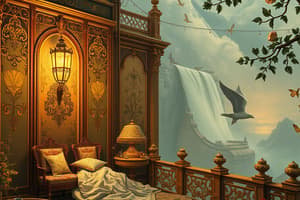Podcast
Questions and Answers
What type of irony is demonstrated when Fortunato believes he is going to enjoy a night of fun but instead faces a dark fate?
What type of irony is demonstrated when Fortunato believes he is going to enjoy a night of fun but instead faces a dark fate?
- Dramatic Irony
- Absurd Irony
- Verbal Irony
- Situational Irony (correct)
What does the name 'Fortunato' ironically imply in the story?
What does the name 'Fortunato' ironically imply in the story?
- He is a jester
- He is unfortunate (correct)
- He is noble
- He is wealthy
What is the best definition of a motif in literary works?
What is the best definition of a motif in literary works?
- An underlying message or theme
- A one-time event in the story
- A personal character trait
- A recurring element with symbolic significance (correct)
Which of the following statements is an example of verbal irony in the story?
Which of the following statements is an example of verbal irony in the story?
What type of irony is present when the reader knows Montresor's intentions while Fortunato remains unaware?
What type of irony is present when the reader knows Montresor's intentions while Fortunato remains unaware?
What is the effect of Fortunato's costume on the story's irony?
What is the effect of Fortunato's costume on the story's irony?
Which statement best describes sarcasm within the context of the story?
Which statement best describes sarcasm within the context of the story?
How does Montresor’s action of throwing a torch over the wall enhance the story's irony?
How does Montresor’s action of throwing a torch over the wall enhance the story's irony?
What is a primary function of motifs in a literary work?
What is a primary function of motifs in a literary work?
Which of the following is NOT a type of motif mentioned?
Which of the following is NOT a type of motif mentioned?
What does the sound of the bells symbolize in 'Cask of Amontillado'?
What does the sound of the bells symbolize in 'Cask of Amontillado'?
How does Montresor's act of murder relate to the themes in the story?
How does Montresor's act of murder relate to the themes in the story?
What theme is particularly highlighted by Fortunato's pride?
What theme is particularly highlighted by Fortunato's pride?
What does 'Cask of Amontillado' symbolize in the story?
What does 'Cask of Amontillado' symbolize in the story?
Which motif contributes to the story's atmosphere of deception and betrayal?
Which motif contributes to the story's atmosphere of deception and betrayal?
What role do the catacombs play in the narrative?
What role do the catacombs play in the narrative?
Flashcards are hidden until you start studying
Study Notes
Irony
- Situational irony occurs when outcomes differ from expectations; Fortunato, despite his name meaning "fortunate," meets a grim fate in the catacombs.
- Dramatic irony is established as readers are aware of Montresor's hatred towards Fortunato while Fortunato remains oblivious to the danger.
- Fortunato's jester costume contrasts with his fate, as he believes Montresor's sinister actions are humorous, adding to the story’s ironic tension.
- Montresor’s repeated pleas for Fortunato to "return" before chaining him highlight verbal irony, as he intends to keep him captive.
Motif
- A motif is a recurring element with symbolic significance that enriches themes within a narrative.
- Key characteristics of motifs include repetition, symbolic meaning, contribution to themes, and variety, encompassing images, objects, phrases, or situations.
- The sound of bells serves as a motif, symbolizing a memento mori—a reminder of death, emphasizing the dark turn of events as Fortunato descends further.
Symbolic Meanings
- The bells jingling can represent the inevitability of death, growing ominous as Fortunato plunges deeper into the catacombs.
- The descent symbolizes a moral decline; Montresor’s vengeance mirrors the trials of sinners in Dante’s Hell, reflecting a fall from grace.
- The bells amplify the themes of deception and irony, contributing to the story's unsettling atmosphere and highlighting Fortunato’s tragic misjudgment.
Themes
- Revenge is central, illustrating the extremes one may reach to settle scores.
- Pride and foolishness characterize Fortunato, whose overconfidence in wine knowledge led him into Montresor’s trap.
- Deception and betrayal are woven throughout, as Montresor ensnares Fortunato under the pretense of friendship.
Symbols
- The cask of Amontillado acts as bait, representing the lure that draws Fortunato to his doom.
- The catacombs signify death and Montresor's concealed malice.
- The jester’s costume embodies Fortunato's foolishness and his role as the unsuspecting victim in the plot.
Studying That Suits You
Use AI to generate personalized quizzes and flashcards to suit your learning preferences.




